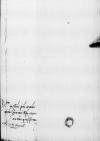Letter #2983
Stanisław WŁOSZEK to Ioannes DANTISCUSVilnius, 1546-07-07
| received Rössel (Reszel), 1546-07-14 Manuscript sources:
| ||||
Text & apparatus & commentary Plain text Text & commentary Text & apparatus
Reverendissimo in Christo Patri et Domino, domino
Reverendissime in Christo Pater et Domine, domine gratiosissime.
Ex novissimis litteris Reverendissimae Paternitatis Vestrae hoc nuntio allatis intellexi, quam grato susceperit Reverendissima Paternitas Vestra animo humilem meam erga se serviendi propensionem. Quae gratitudo, quia coeptum merendi superat studium, accendit animum et stimulum addit currenti, ut tanto maiore studio sim laboraturus, quo aliquando merita tandem respondeant gratitudini, ea praesertim via, quam demonstrat Reverendissima Paternitas Vestra, ut subinde sacrae
Hoc unum arbitratus sum necessarium significare Reverendissimae Paternitati Vestrae magnificum dominum
Reliquum est, quod me et deditissima servitia mea Reverendissimae Paternitati Vestrae indies commendatiora esse cupio.
Quam Dominus noster Ihesus diu florentem foveat, ex animo preco[r].
Datae
Reverendissimae Paternitatis Vestrae deditissimus servitor


